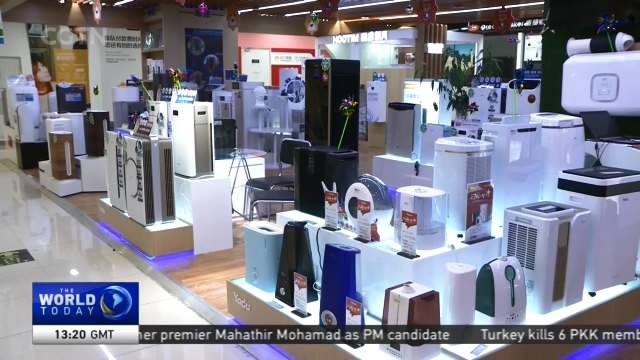
21:54, 07-Jan-2018
Beijing Air Quality Improves: Sales of smog-related products struggle as air gets cleaner

After five years fighting air pollution, China's capital city of Beijing is finally breathing noticeably cleaner air. Local weather authorities hailed progress on cleaning the environment, following a 2013 plan that ordered the city to reduce particulate matter to less than 60 micrograms. This is welcome news to just about everyone. But as CGTN reporter Meng Qingsheng finds out, there's one drawback for some.
It's another day for safer outdoor activities in Beijing, without choking smog, and no need to wear facial masks. Official data show the city recorded only 23 heavy pollution days in 2017, compared to 58 back in 2013. And over two-thirds of the whole year were good air days.
YAN CHANGLEI BEIJING RESIDENT "I have been living in Beijing for ten years. In the past, I wore facial masks on smoggy days. Conditions have improved a lot. And now I can take my children out to play on weekends."
HAN ZHE BEIJING RESIDENT "Previously, the first thing I did when getting ready to go out was grab a facial mask, and put it on immediately. But now, I seldom do that."
The capital saw a heavy burst of smog in 2013. People spent over half the year living under a hazy spell. On January 12th of that year, the PM2.5 reading once surpassed 900 micrograms per cubic meter in downtown areas. The spell forced Beijing to issue its first orange alert in history for heavy smog.
MENG QINGSHENG BEIJING "Authorities say several factors are contributing to the improvement of air quality in Beijing, including efforts to demolish coal-fired boilers and the reduction of high-emission vehicles. An obvious sign of the improvement is the reduced sales of smog-related products."
Inside shopping centers of Beijing's commercial hotspots, most of the facial masks on shelves remain untouched. It's pretty much the same for other household products, like air purifiers. Mr. Wang has been working in the store for three years.
WANG WANLI AIR PURIFIER SALESPERSON "I used to sell 20 to 30 air purifiers each day during peak smoggy weather. But now, the number is less than ten for a whole week."
Potential customers finally appeared after about two hours' waiting.
HUANG LEI CUSTOMER "Beijing's air quality improved in 2017. But it's still worse than in southern China. I still use an air purifier to deal with it."
Beijing authorities have vowed to limit 2.5PM particle emissions to 35 micrograms per cubic meter by 2030. It's still higher than the maximum of 10 micrograms recommended by the World Health Organization.
LI XIANG, DIRECTOR OF AIR QUALITY CONTROL BEIJING ENVIRONMENTAL PROTECTION BUREAU "Vehicle emissions take up an increasing percentage of the total pollutants in Beijing. As a next step, we will intensify supervision of high-emission vehicles."
Officials also attribute these improvements to drier and windier weather over the past year. But they have decided to make sure the trend sticks, by tightening controls over polluters, keeping the sky blue over the capital. Meng Qingsheng, CGTN, Beijing.

SITEMAP
Copyright © 2018 CGTN. Beijing ICP prepared NO.16065310-3
Copyright © 2018 CGTN. Beijing ICP prepared NO.16065310-3